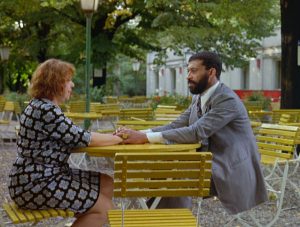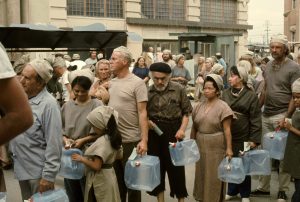WORKING GIRLS – Not Available on DVD!
Dorothy Arzner (U.S. 1931) 77 min. 35MM. With Judith Wood, Dorothy Hall, Charles “Buddy” Rogers.
Dorothy Arzner was the only female — let alone out lesbian —filmmaker working at a major Hollywood studio in the 1920s and ’30s, under contract at Paramount and making several pictures a year. In Working Girls, two sisters from the Midwest move to New York City in search of fortune, wind up in a homeless shelter, then quickly find jobs and men. But Arzner’s focus on the women’s internal lives and their relationship makes the film much more than a standard pre-Code comedy or morality play. Rather, it’s about two women’s lives, lived with humor, sadness, frustration, and sublimity, a nuanced examination of the intersection of class and gender in Depression-era urban America. Co-presented by Women’s & Gender Studies and CSREG. Adapted from Northwest Film Center program notes. 35mm preservation print courtesy of the UCLA Film & Television Archive.
TOP OF PAGE
Tuesday, January 23 at 7pm
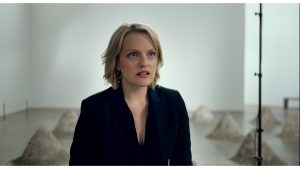
THE SQUARE – Area Premiere!
Ruben Östlund (Sweden 2017) 151 min. DCP. With Claes Bang, Elisabeth Moss, Dominic West, Terry Notary. Swedish with English subtitles.
The winner of this year’s Palme d’Or at Cannes is a social satire that aims its sights most squarely on the art world, where Christian (Bang) is the respected curator of a contemporary art museum and a divorced but devoted father of two who drives an electric car and supports good causes. Co-presented by the Department of Art & Art History.
“The Square is a film with plenty on its mind, tweaking art-world pretensions and liberal pieties, exploring the gap between belief and action, contemplating the relationship between the individual and the collective… a refreshing change from the white elephants — the solemnly respectable prestige films with clear intentions and predetermined meanings — that more frequently take festival prizes.” — Dennis Lim, Artforum
TOP OF PAGE
Tuesday, January 30 at 7pm
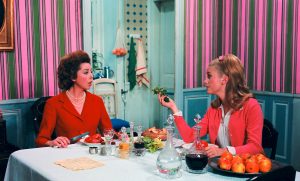
THE UMBRELLAS OF CHERBOURG
Jacques Demy (France 1964) 92 min. DCP. With Catherine Deneuve, Nino Castelnuovo, Anne Vernon. French with English subtitles.
Jacques Demy was the director who brought the American musical comedy to France, infusing the form with an eye toward how magic or fate help or hinder l’amour. Married to Agnès Varda, and enmeshed in the community of the “Left Bank Group” that was making movies alongside New Wave rebels like Godard, Demy was an original. In The Umbrellas of Cherbourg, an angelic Catherine Deneuve plays an umbrella-shop owner’s delicate daughter, glowing with first love for a handsome garage mechanic (Castelnuovo) who is shipped off to fight in Algeria. A heart-tugger with kaleidoscopic colors and lilting songs by the great composer Michel Legrand, this is one of the most revered and unorthodox movie musicals of all time.
FACES PLACES – Area Premiere!
Agnès Varda and JR (France 2017) 90 min. DCP.
89-year-old Agnès Varda, one of the leading figures of the French New Wave, and acclaimed 33-year-old French photographer and muralist JR teamed up to co-direct this enchanting documentary road movie. Kindred spirits, Varda and JR share a lifelong passion for images and how they are created, displayed and shared; they traveled together around the villages of France in JR’s photo truck meeting locals, learning their stories and producing their epic-size portraits.
“The subject of Faces Places is the heroism of daily life… One of the crucial distinctions between the films of Varda and those of Godard is that her past surges forth into her films with a sense of equilibrium, attachment and gratitude, whereas Godard’s past enters his films with a sense of destabilization, irresolution and regret. The memorious innerlandscape of Godard’s films is one of incompletion, guilt and ruins; that of Varda’s films is one of the enduring, the venerable, the fulfilling. Godard’s films are burdened with the past; Varda’s are enriched by it.” — Richard Brody, The New Yorker
TOP OF PAGE
Tuesday, February 13 at 7pm
ALI: FEAR EATS THE SOUL
Rainer Werner Fassbinder (Germany 1973) 93 min. 35MM. With Brigitte Mira, El Hedi Ben Salem, Irm Hermann. German with English subtitles.
A beautiful homage to Douglas Sirk’s classic melodrama All That Heaven Allows (1955), Fassbinder’s improbable love story pairs a German widow with a Moroccan immigrant 20 years her junior. The prejudice and discrimination they encounter from all sides reveals a cracked humanity in this seminal work of the German New Wave. A heartwarming, and heartbreaking, romance for the eve before Valentine’s Day.
TOP OF PAGE
Tuesday, February 20 at 7pm

THE QUEEN OF VERSAILLES
Lauren Greenfield (U.S. 2012) 103 min. 35MM.
Acclaimed photographer Lauren Greenfield (Thin, Beauty Culture) made this character-driven documentary about a billionaire family that comes from humble origins, and encounters financial challenges in the wake of the economic crisis. The American Dream depicted includes “jaw-dropping scenes of consumption and comeuppance that, writ large, strangely mirror the fortunes of less extravagant Americans” (New York Times); it also earned the director a lawsuit, when its subject accused the film of portraying his business “in an array of defamatory, derogatory and damaging ways.” Co-presented by the Samek Museum, on the occasion of the exhibition 1%: Privilege in a Time of Global Inequality.
TOP OF PAGE
Tuesday, February 27 at 7pm
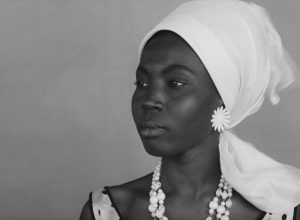
BLACK GIRL – Restoration!
Ousmane Sembène (Senegal 1966) 80 min. DCP. With Mbissine Therese Diop, Anne-Marie Jelinck, Momar Nar Sene. French with English subtitles.
Ousmane Sembène was one of the most groundbreaking filmmakers who ever lived, as well as the most renowned African director of the 20th century — and yet his name still deserves to be better known in the rest of the world. His feature debut was the stirring Black Girl, a deceptively simple story about a young Senegalese woman who moves to France to work for a wealthy white family and finds herself a prisoner, both figuratively and literally. Sembène’s layered critique of the lingering colonialist mindset of a supposedly postcolonial world is a radical political statement — and one of the essential films of the 1960s. Preceded by Borom sarret, Sembène’s acclaimed 1963 short. Introduced by Alicia Hayashi Lazzarini, Post Doctoral Fellow of geography, in conjunction with her course “Contemporary Africa & Colonial Pasts: Investments and Re-Emergences.”
VARIATIONS ON A FORM – Metrograph Programming Director in Person!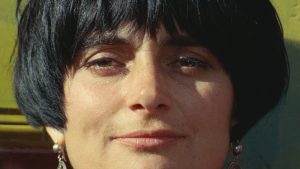
Four non-narrative films: not documentaries, not hybrids. No explanations and no talking heads. Making a statement but not “issue” films. Meticulous films made with what’s at hand: stills, newsreel and and music in NOW!, found footage in Louise Smells a Rat, the legal and illegal canvases of a city in Stations and finally a day long visit to a unknown relative in Uncle Yanco. Films made for endless revisits, like songs. Films that make one want to get to work. NOW! (Santiago Alvarez, 16mm., 6 min.); Stations of the Elevated (Manfred Kirchheimer, DCP, 45 min.); Uncle Yanco (Agnés Varda, 35mm., 22 min.); Louise Smells a Rat (Anne Flournoy, 16mm., 5 min.) Curated and presented by Jacob Perlin, the Artistic and Programming Director of Metrograph, New York City’s new and noteworthy independent movie theater.
TOP OF PAGE
Tuesday, March 20 at 7pm
LET THE FIRE BURN – Director in Person!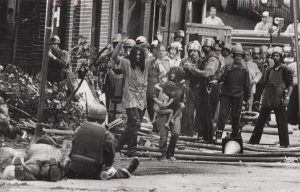
Jason Osder (U.S. 2013) 95 min. DCP.
Jason Osder crafted a found-footage film that unfurls with the tension of a great thriller. On May 13, 1985, a longtime feud between the city of Philadelphia and controversial radical urban group MOVE came to a deadly climax. By order of local authorities, police dropped military-grade explosives onto a MOVE-occupied rowhouse. TV cameras captured the conflagration that quickly escalated—and resulted in the deaths of eleven people and the destruction of 61 homes. Using only archival news coverage and interviews, first-time filmmaker Osder has brought to life one of the most tumultuous and largely forgotten clashes between government and citizens in modern American history. The screening will be followed by a discussion of issues raised by the film and is co-presented by the Griot Institute for Africana Studies in conjunction with the Spring 2018 Lecture & Performance Series “ERASURE: BLACKNESS AND THE FIGHT AGAINST INVISIBILITY.”
TOP OF PAGE
Tuesday, March 27 at 7pm
THE DRAGON’S DEFENSE – Director in Person!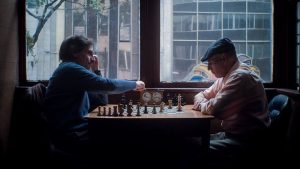
Natalia Santa (Columbia 2017) 79 min. DCP. With Victoria Hernandez, Maia Landaburu, Hernán Méndez. Spanish with English subtitles.
Screened in the prestigious Directors’ Fortnight section of the 2017 Cannes Film Festival, The Dragon’s Defense is a chamber drama revolving around three old friends in downtown Bogota. A chess player and small-time gambler, a watchmaker and a Basque homeopath whose vocation is poker spend their days finding comfort in the confines of their routines. Co-presented with Bucknell’s Latin American Studies Program. Introduced by Professor David Rojas.
“In her debut feature, Colombian screenwriter-turned-director Natalia Santa harvests quiet moments of humanity and poetry from the humdrum lives of three washed-up older men in recessionary Bogota. Some might be tempted to slot it into a certain whimsical-melancholy strand of Latin American cinema; Daniel Burman and Alvaro Brechner spring to mind. Yet The Dragon’s Defense’s keen sense of how people can be molded by their environment until they become part of the background is refreshingly original, and conveyed with real directorial panache.” – Lee Marshall, Screen Daily
WESTERN – Area Premiere!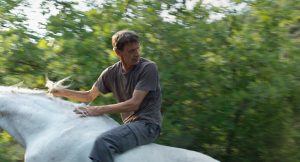
Valeska Grisebach (Germany, Bulgaria, Austria 2017) 119 min. DCP. With Meinhard Neumann, Reinhardt Wetrek, Syuleyman Alilov Letifov. German, Bulgarian, English with English subtitles.
Its title deliberately evoking the legacy of classic Hollywood frontier sagas, Western follows a group of German men who depart for rural Bulgaria to earn money on a water facility project. Dust-ups between the workers and the locals quickly ensue as the problem of language barriers is compounded by residual postwar resentment, antagonistic nationalism and aggressive behavior. Casting non-actors in all of the roles and embedding herself in the Bulgarian countryside for a long duration, Grisebach subtly and intelligently forges a new kind of revisionist western, taking the tropes of filmmakers like Howard Hawks and John Ford and relocating them to a new frontier — one traversed by an unforgettable cowboy who ventures beyond the fear of the Other (Andréa Picard, for Toronto International Film Festival).
TOP OF PAGE
Tuesday, April 10 at 7pm
THE CHILD (L’ENFANT)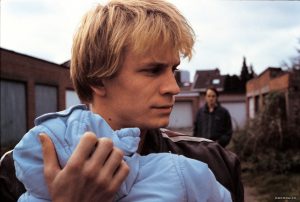
Jean-Pierre and Luc Dardenne (Belgium/France 2005) 95 min. 35MM. With Jérémie Renier, Deborah Francois, Jeremie Segard. In French with English subtitles.
Winner of the 2005 Palme d’Or at Cannes, The Child is cinema at its purest, creating reality out of the most minimal techniques, and emotion from the slimmest of narratives. A petty criminal has just become a father, but for this twenty-year-old amateur swindler, “taking care of the baby” spawns an act defined more by commerce than affection, and turns a careless life into something more than a game. Dickensian street kids, underworld fences and some kinetic chase scenes all become part of the Dardennes’ spiritual and social concern for forgotten, discarded members of society. The Child is, as A. O. Scott (New York Times), described it, “a rich, almost literary work of art, steeped in a spirituality that recalls Dostoevsky and Robert Bresson.” Adapted from Pacific Film Archive program notes. Co-Presented with the Program of French & Francophone Studies. Introduced by Professor Nathalie Dupont.
TOP OF PAGE
Tuesday, April 17 at 7pm
SOYLENT GREEN
Richard Fleischer (U.S. 1973) 97 min. DCP. With Charlton Heston, Edward G. Robinson, Leigh Taylor-Young.
The year is 2022, the location New York City. Overcrowding, pollution and resource depletion have made finding food for the masses the urgent task for society’s leaders. The population survives on products manufactured from ocean plankton by Soylent Industries. When a Soylent board member is murdered, the detective working the case discovers a ghastly secret. Made a few years after the first Earth Day, and a window into some of the vexing political issues of the 1970s, today Soylent Green’s dystopian vision feels less like science-fiction and more like current crises. Co-presented by Bucknell’s Center for Sustainability and the Environment and presented in conjunction with Earth Month! Introduced by History Professor James Goodale.
TOP OF PAGE
Tuesday, April 24 at 7pm
FOXTROT – Exclusive Premiere! 
Samuel Maoz (Israel/Germany/France/Switzerland 2017) 114 min. DCP. With Lior Ashkenazi and Sarah Adler. Hebrew, Arabic and German with English subtitles.
One of the highlights of the 2017 Toronto Film Festival, and the winner of the 2017 Venice Film Festival Grand Jury Prize, Foxtrot also swept the Israeli Academy Awards–though it was highly controversial. An upper-class couple experiences gut-wrenching grief when army officials show up at their home to announce the death of their son; but what begins as a harrowing depiction of mourning turns into something stranger and more ambitious. In the follow-up to his debut feature, Lebanon (which won the Golden Lion at the 2009 Venice Film Festival and took the foreign-film world by storm), Samuel Maoz has created a provocative and fearless film, politically charged, stylistically thrilling, “march[ing] boldly through the no-man’s-land between realism and surrealism” (Film Comment). Co-presented with Bucknell’s Center for Jewish Life Office.
“Image by image, and with invocations of history and the Holocaust, Mr. Moaz suggests that normalizing catastrophic violence — and routinizing mourning — is finally little else than nihilism.” – Manohla Dargis, The New York Times


